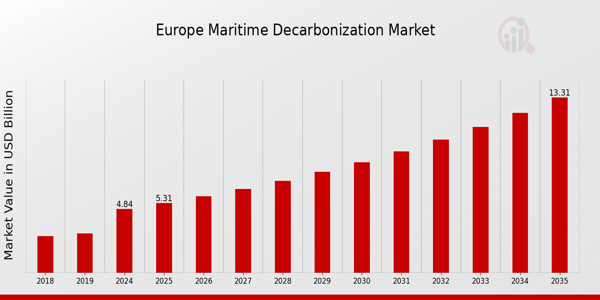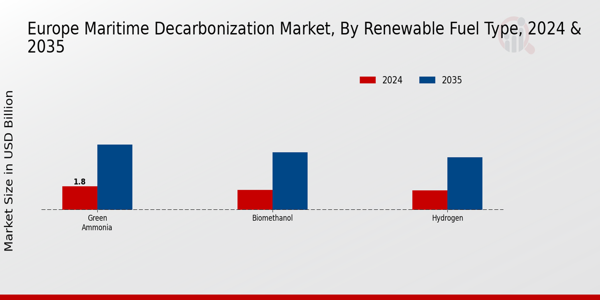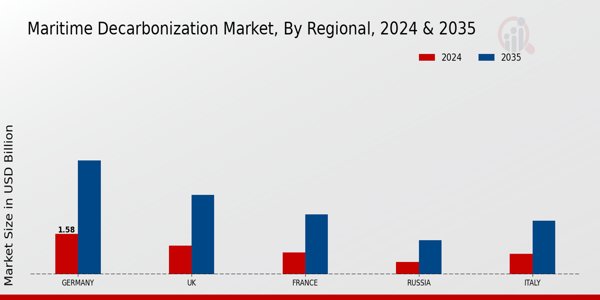
Europe Maritime Decarbonization Market
Europe Maritime Decarbonization Market Research Report: By Renewable Fuel Type (Green Ammonia, Hydrogen, Biomethanol), By Application (Ships, Ports, Others), andBy Regional (Germany, UK, France, Russia, Italy, Spain, Rest of Europe)- Forecast to 2035
Europe Maritime Decarbonization Market Overview:
As per MRFR analysis, the Europe Maritime Decarbonization Market Size was estimated at 4.42 (USD Billion) in 2023.The Europe Maritime Decarbonization Market is expected to grow from 4.84(USD Billion) in 2024 to 13.33 (USD Billion) by 2035. The Europe Maritime Decarbonization Market CAGR (growth rate) is expected to be around 9.636% during the forecast period (2025 - 2035).
Key Europe Maritime Decarbonization Market Trends Highlighted
A number of significant market factors are driving the maritime decarbonization market in Europe and encouraging the industry to adopt more environmentally friendly methods. The EU's aggressive goals to achieve carbon neutrality by 2050 have had a big impact on maritime businesses' adoption of greener technologies.
Regulations that promote investment in renewable energy sources and environmentally friendly shipping are also being fostered by initiatives such as the European Green Deal. A move toward low-carbon alternatives is also encouraged by stakeholder pressures, such as those from customers and environmental organizations, guaranteeing adherence to upcoming emissions rules.
The development and integration of alternative fuels, such hydrogen and ammonia, which have the potential to drastically lower greenhouse gas emissions, are among the opportunities to be investigated in this industry. Furthermore, improvements in fuel cell systems and battery technology offer feasible ways for ships to run more sustainably and efficiently.
Public-private partnerships are also becoming more prevalent in the European marine industry with the goal of financing research and development for cutting-edge decarbonization solutions. More money is being spent on research and development for energy-efficient ships and automation systems that improve fuel management, according to recent trends.
In order to reduce emissions and enhance vessel performance, operations are becoming more efficient through the use of digital solutions like AI and IoT. Furthermore, international partnerships and industrial sectors are working together more and more to create common standards and exchange best practices in decarbonization initiatives.
A holistic strategy to addressing climate change is being signaled by the move towards sustainable maritime practices, which is not just a legislative response but is also increasingly viewed as a competitive advantage in the European market. The future of marine transportation in Europe will be shaped by these themes as they develop, highlighting a shared dedication to sustainability.

Source: Primary Research, Secondary Research, Market Research Future Database and Analyst Review
Europe Maritime Decarbonization Market Drivers
Regulatory Pressure for Emission Reductions
The Europe Maritime Decarbonization Market is significantly driven by stringent regulations enforced by the European Union (EU). The EU has set ambitious targets to reduce greenhouse gas emissions by at least 55% by 2030 compared to 1990 levels, as part of the European Green Deal and the Climate Law.
This initiative compels maritime operators to invest in decarbonization technologies, such as liquefied natural gas (LNG) and hydrogen fuel cells. Furthermore, the International Maritime Organization (IMO) has set a target to reduce total annual greenhouse gas emissions by at least 50% by 2050.
The need to comply with these regulations stimulates investments in innovative green technologies, thus propelling the overall growth of the Europe Maritime Decarbonization Market.
Increased Focus on Sustainability
Growing awareness and demands from stakeholders regarding sustainability are critical drivers of the Europe Maritime Decarbonization Market. Various shipping companies have committed to adopting more sustainable practices in response to consumer preference for eco-friendly transportation.
According to the European Community Shipowners' Associations, more than 90% of maritime stakeholders are prioritizing sustainability in their operational strategies. This acute shift in focus has caused companies to pursue Research and Development (R&D) for alternative energy sources, thereby fostering market growth and innovation in the sector.
Technological Advancements in Shipping
Technological breakthroughs are propelling the Europe Maritime Decarbonization Market forward. Advances in automation, artificial intelligence, and fuel efficiency technologies are redefining the maritime operations landscape.
Research suggests that by employing energy-efficient vessel designs and alternative fuels like methyl alcohol and biofuels, shipping companies can reduce carbon emissions by up to 30%. Noteworthy organizations, such as the European Space Agency, are collaborating with maritime stakeholders to develop innovative solutions aimed at tracking emissions and fostering sustainability.
These advancements not only improve operational efficiencies but also significantly contribute to the decarbonization efforts within the industry.
Investment Opportunities in Clean Energy
The Europe Maritime Decarbonization Market is witnessing a surge in investment opportunities focused on clean energy initiatives. According to the European Investment Bank, funding for green projects increased by around 25% in the past two years, with maritime technologies receiving a growing share of these investments.
Public-private partnerships have encouraged financial backing for developing next-generation fuels and hybrid shipping solutions. With the potential to generate high returns on investment and positively impact the environment, these clean energy projects are attracting substantial interest from investors, further accelerating growth in the maritime decarbonization sector.
Europe Maritime Decarbonization Market Segment Insights:
Maritime Decarbonization Market Renewable Fuel Type Insights
The Renewable Fuel Type segment within the Europe Maritime Decarbonization Market is witnessing significant advancements as the shipping industry actively seeks solutions to reduce greenhouse gas emissions.
This segment is crucial as it addresses the need for cleaner energy sources in maritime operations, which are increasingly under scrutiny due to regulatory pressures and environmental concerns. Among the leading alternatives, Green Ammonia is grabbing attention due to its potential to be used as a zero-emission fuel.
It can easily be transported and stored, making it a flexible option for shipping companies aiming for sustainability while complying with international guidelines. Additionally, Hydrogen is emerging as another pivotal renewable fuel type, benefiting from its versatility and ability to integrate into existing infrastructure, enabling significant reductions in emission levels.
Biomethanol, while lesser known, also plays an important role, providing a sustainable alternative derived from organic materials, thus contributing to circular economy initiatives within the maritime sector. The growing emphasis on these renewable fuels is driven by the need for innovation and sustainability, creating considerable opportunities for stakeholders in this segment of the market.
As the industry evolves and strives for decarbonization, the Renewable Fuel Type segment is expected to continuously adapt and respond to market demands, fostering advancements that will shape the Europe Maritime Decarbonization Market.

Source: Primary Research, Secondary Research, Market Research Future Database and Analyst Review
Maritime Decarbonization Market Application Insights
The Application segment of the Europe Maritime Decarbonization Market encompasses various crucial areas, including Ships, Ports, and Others, reflecting the diverse approaches to reducing carbon emissions within the maritime industry.
Ships represent a vital aspect of this segment, as advancements in vessel design, engine technology, and alternative fuels are essential for achieving low-emission targets set by European governments. Meanwhile, Ports play a significant role in decarbonization efforts, with initiatives focusing on electrification, efficient logistics, and enhancing shore power capabilities to support vessels at berth.
The Others category captures innovations spanning a range of services and technologies aimed at improving overall maritime efficiency. This segment is particularly important as it addresses the complex interdependencies within the supply chain and promotes collaboration among various stakeholders.
As the industry prioritizes sustainability, the Europe Maritime Decarbonization Market segmentation reflects substantial investment trends and policy shifts in response to EU regulations targeting a greener future. Overall, these segments contribute to the overarching goal of reducing greenhouse gas emissions and fostering a more environmentally friendly maritime landscape in Europe.
Maritime Decarbonization Market Regional Insights
The Regional segment of the Europe Maritime Decarbonization Market showcases diverse opportunities across various countries, each contributing uniquely to the industry's growth. Germany stands as a leader, reflecting a strong commitment to sustainable shipping practices, supported by innovative policies and technological advancements.
The UK benefits from its robust maritime infrastructure and is increasingly focusing on green technologies to meet environmental regulations. France is enhancing its maritime decarbonization through investment in renewable marine energy, while Russia is beginning to explore its vast maritime resources more sustainably.
Italy brings its strategic geographic location to the forefront, promoting eco-friendly shipping operations. Spain is also discovering its potential, emphasizing environmental regulations and sustainability initiatives.
The Rest of Europe highlights a collective effort towards decarbonization, fueled by collaborative policies and the European Union's ambitious climate objectives. Together, these regional dynamics create a comprehensive landscape for the Europe Maritime Decarbonization Market, driven by innovation, regulatory support, and a societal push towards environmental responsibility.

Source: Primary Research, Secondary Research, Market Research Future Database and Analyst Review
Europe Maritime Decarbonization Market Key Players and Competitive Insights:
The Europe Maritime Decarbonization Market has witnessed significant transformations as stakeholders across the shipping and maritime sectors increasingly recognize the urgent need to transition towards environmentally sustainable practices.
The competitive landscape is characterized by a blend of established players and emerging startups that are focused on innovating technologies and solutions aimed at reducing the carbon footprint of maritime operations. Investment in alternative fuels, energy efficiency technologies, and regulatory compliance measures is driving competition as market participants strive for leadership in this evolving landscape.
As concerns regarding climate change intensify, maritime companies are not only aiming to meet regulatory requirements but are also seeking competitive advantages that promote sustainability while enhancing operational efficiency.
Engie operates effectively within the Europe Maritime Decarbonization Market with a robust focus on integrating sustainable energy solutions. The company has established itself as a leader in promoting the adoption of low-carbon technologies and supporting decarbonization goals within the maritime sector.
Engie's strengths lie in its extensive experience in providing renewable energy solutions, financial backing, and adept project management capabilities that allow it to collaborate on large-scale maritime decarbonization projects.
The company’s strategic partnerships and investments in decarbonization technologies, coupled with its comprehensive energy service capabilities, position it favorably within the European market. Engie's engagement with various stakeholders, including ship owners and maritime operators, facilitates its influence on industry-wide shifts towards sustainable energy adoption.
Kongsberg Gruppen is a prominent player in the Europe Maritime Decarbonization Market, recognized for its advanced technological offerings aimed at reducing emissions in maritime operations. The company specializes in digital solutions, automation, and data analytics that enhance fuel efficiency and promote greener maritime practices.
Kongsberg Gruppen's key products and services include integrated systems for vessel optimization, autonomous shipping technologies, and analytics solutions that help clients monitor and reduce their carbon emissions. With a strong market presence bolstered by recent mergers and acquisitions, Kongsberg has expanded its capabilities to provide holistic solutions that foster sustainability.
The company’s commitment to innovation and sustainability not only showcases its market strengths but also exemplifies its active role in shaping the future of the maritime industry in Europe, reflecting a commitment to technological advancement and ecological responsibility.
Key Companies in the Europe Maritime Decarbonization Market Include:
Engie
Kongsberg Gruppen
RollsRoyce
Ceres Media
Chemoil
Siemens
Suez
BP
Hempel
DNV
Wärtsilä
Elekta
A.P. Moller Maersk
Shell
TotalEnergies
Europe Maritime Decarbonization Market Developments
In recent months, the Europe Maritime Decarbonization Market has witnessed significant developments, driven by the urgency for sustainable shipping practices. In October 2023, A.P. Moller - Maersk announced a strategic partnership with Siemens to advance green technologies that would reduce emissions in marine operations.
Meanwhile, Wärtsilä disclosed plans to invest in advanced renewable fuel research to enhance their maritime solutions. The market's growth trajectory has been influenced by increasing regulatory pressures, with the European Union enforcing stricter emissions norms, in line with its Green Deal objectives.
Notably, in April 2023, Shell took a decisive step by acquiring a biofuels company specializing in marine fuels, aimed at diversifying its decarbonization portfolio. Engie and DNV have also rolled out collaborative initiatives to develop carbon capture and storage solutions tailored for shipping.
The sector's financial dynamics are shifting, as seen with increased investments in decarbonization technologies, reflecting a growing valuation across major players, including RollsRoyce and TotalEnergies. Collectively, these trends indicate a substantial shift towards greener practices within the maritime segment, aligning with Europe's commitment to achieving carbon neutrality by 2050.
Europe Maritime Decarbonization Market Segmentation Insights
Maritime Decarbonization Market Renewable Fuel Type Outlook
Green Ammonia
Hydrogen
Biomethanol
Maritime Decarbonization Market Application Outlook
Ships
Ports
Others
Maritime Decarbonization Market Regional Outlook
Germany
UK
France
Russia
Italy
Spain
Rest of Europe
FAQs
What is the current size of the Europe Maritime Decarbonization Market in 2024?
The Europe Maritime Decarbonization Market is expected to be valued at 4.84 billion USD in 2024.
What is the projected market size for the Europe Maritime Decarbonization Market in 2035?
By 2035, the Europe Maritime Decarbonization Market is projected to reach a value of 13.33 billion USD.
What is the expected CAGR for the Europe Maritime Decarbonization Market from 2025 to 2035?
The expected compound annual growth rate (CAGR) for the Europe Maritime Decarbonization Market from 2025 to 2035 is 9.636%.
Which region holds the largest market share in the Europe Maritime Decarbonization Market as of 2024?
Germany holds the largest market share in the Europe Maritime Decarbonization Market, valued at 1.58 billion USD in 2024.
How is the France's market size projected to change from 2024 to 2035?
France's market size is expected to increase from 0.86 billion USD in 2024 to 2.34 billion USD by 2035.
What are the key emerging trends in the Europe Maritime Decarbonization Market?
Key trends include the increasing adoption of renewable fuels like green ammonia and hydrogen due to environmental regulations.
Who are the major players in the Europe Maritime Decarbonization Market?
Major players in the market include Engie, Kongsberg Gruppen, RollsRoyce, Ceres Media, and Siemens.
What is the market size of green ammonia in the Europe Maritime Decarbonization Market by 2035?
The market size for green ammonia is projected to reach 4.95 billion USD in 2035.
What challenges does the Europe Maritime Decarbonization Market face?
Challenges include high initial investment costs and the need for technological advancements in renewable fuel production.
How much is the UK expected to contribute to the Europe Maritime Decarbonization Market by 2035?
The UK is expected to contribute a market value of 3.1 billion USD to the Europe Maritime Decarbonization Market by 2035.
Kindly complete the form below to receive a free sample of this Report
Customer Stories

“This is really good guys. Excellent work on a tight deadline. I will continue to use you going forward and recommend you to others. Nice job”

“Thanks. It’s been a pleasure working with you, please use me as reference with any other Intel employees.”

“Thanks for sending the report it gives us a good global view of the Betaïne market.”

“Thank you, this will be very helpful for OQS.”

“We found the report very insightful! we found your research firm very helpful. I'm sending this email to secure our future business.”

“I am very pleased with how market segments have been defined in a relevant way for my purposes (such as "Portable Freezers & refrigerators" and "last-mile"). In general the report is well structured. Thanks very much for your efforts.”

“I have been reading the first document or the study, ,the Global HVAC and FP market report 2021 till 2026. Must say, good info! I have not gone in depth at all parts, but got a good indication of the data inside!”

“We got the report in time, we really thank you for your support in this process. I also thank to all of your team as they did a great job.”
